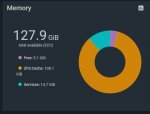- Joined
- Feb 6, 2014
- Messages
- 5,112
This is far more likely to be the cause of your memory woes than any "raw capacity" argument.I do run 2 VMs and Plex Server on it.
Right now you only have 0.4G (400M) free - the ARC is downsized to 9.5G from what I would guess is a normal size closer to the 12G range because of added consumption under the "Services" heading from VMs and Plex.
The "1GB per 1TB" guideline (not a rule) is for logical data written (before compression) as a rough suggestion for how much RAM is needed to hold metadata and some portion of hot data in RAM to accelerate it. Bear in mind that 1GB for each 1TB, if it's devoted entirely to caching live data, lets you hold 0.1% of your data in RAM. That's it - one tenth of a percent. For more performance, you want a higher RAM:space ratio; if you're mostly accessing new data (like different shows every time) or sequential data, you can get away with less.
Writing generalized guidelines for this is very difficult, because there will always be someone who's like "Oh I ran my 100TB on 8GB and it was great!" followed immediately by someone who "Oh my 100TB system was so slow on 32GB that I had to replace the mainboard for one that could do 64GB, why didn't anyone warn me."

